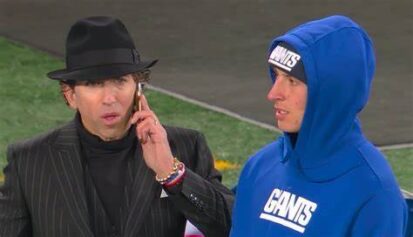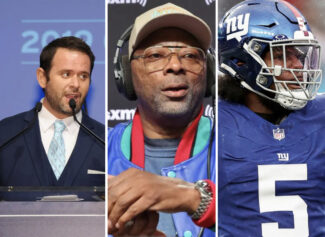When Geno Smith started for the New York Giants yesterday, it was the first time in team history that they started a Black quarterback. While a number of fans and pundits are upset at how the team benched 13-year starter Eli Manning, Smiths start is more significant.
The Giants are the last franchise in the league to start a Black quarterback, but fifty years ago, they became the first team to sign one, Hank Washington. The gap between the signing of Washington and Smiths start is a story about race, leadership, the Civil Rights Movement, and the Black press.
Although fighting for a Black quarterback might seem irrelevant during the civil rights movement, seeing a Black man start at the most visible and important position in pro football had real benefits. As a Maryland economics professor wrote in 1958, There have been great strides in abolishing barriers in football (but) it seems one particular spot appears to be reserved for Whites onlythe quarterback. . . When a pro team or even a major college team entrusts the signal calling to a colored boy, then integration can be said to have been firmly established. In other words, a Black professional quarterback demonstrated that Whites would accept Black leadership, recognize Black intelligence, and concede to Black authority.
The prospect that a Black man could play professional quarterback started to form in the late 1950s when some predominantly white institutions started playing Black quarterbacks.
undefined
undefined
In 1957 when Wisconsin started Sid Williams, it signaled a potentially new racial trajectory in American history. Williams hailed from Dunbar High School, the all-Black school in Little Rock, Arkansas, and his success and leadership at Wisconsin demonstrated the capabilities of integration in education. While the National Guard was deployed to his hometown to ensure integration, Williams shined at his White school. According to Ebony, The Little Rock fiasco and his conduct under fire in a difficult and demanding position have made him something of a hero to many Americans.
His coached claimed, Hes the kind of boy you would rather have on your side, a clear indication that his presence suggested integration would be okay. Of his important position, Williams said, Im kind of proud. I just hope that it will prove that anybody capable can play quarterback or any other position.
The next year, Big Ten teams started three Black quarterbacks.
Despite the fact that Black college quarterbacks had success, professional teams either did not draft them. Or if they did, they selected them for their athleticism with the intention of switching them to play receiver, running back or defensive back.
Gene Washington, for example, who started his college career playing quarterback at Stanford, intentionally switched his position in college to avoid pro footballs racism. I knew a Black quarterback would have little chance in pro ball unless he was absolutely superb. What usually happens is that the pro team tells you theres no place for you at quarterback, but they can use you as a defensive back or a flanker, he said.
undefined
undefined
Sid Williams, who graduated with a chemical engineering degree, had his named called in the 11th round to play defensive back, but he never played a down in the NFL. And the Black quarterbacks who followed Williams in the Big Ten, including standouts Sandy Stephens of Minnesota, the first All-American Black quarterback, and Wilburn Hollis of Iowa, never received an opportunity to prove themselves at the next level. Stephens, drafted by the liberal minded Paul Brown and the Browns, had to test his quarterback skills in Canada, an all too familiar history for Black quarterbacks. And although the Giants drafted Marquettes Pete Hall in the 1960, he had to play receiver to make the team.
Black writers, coaches, and players, knew the reason behind this racism: professional teams did not believe Blacks had the intelligence or leadership skills to run a pro team. Sam Skinner of the San Francisco Sun suggested, The pro teams dont recognize the Black mans mind. They recognize our bodies for beautiful strength, and thats the end of it.
Beyond doubting his intelligence, pro teams did not believe that Southern White players would accept a Black leader. Florida A&Ms Jack Gaither, one of the greatest college football coaches of all time, said, The trouble in the pro league is that every team has some prejudiced playersnot all from the South either. Theyll play alongside colored boys but they wont take direction from them. And at banquet in 1963, Gaither griped Theyll [White players] play next to Negroes but wont take directions from them. Its the same reason a Negro policeman cant arrest a White man in the South. He also told the audience, Only lack of opportunity keeps the Negro from being a quarterback and bias limits opportunity.
And a Black writer from the Pittsburgh Courier argued, One of the great fallacies of our time, he said, is the continuing bar on the use of Negro quarterbacks. The first league that breaks with the past, in favor of a Negro quarterback, will have done both the nation, and his generation of football players, proud.
In 1966, a new candidate emerged as a Black hope that would break the racial barrier – Hank Washington. Touted for his arm strength and size, the 63 210 pound Washington had the makings of a pro quarterback. Rated as one of the most accurate throwers in college, the Los Angeles native threw crisp intermediate passes so hard that receivers struggled to hold on to them. He could reportedly throw the ball 90 yards. He finished his senior season third in passing and first in overall offense. But he had one more quality that gave him the best chance to play at the next level.
Playing his college ball at the integrated West Texas, Washington had proved that he could lead White men, especially Southerners. A Black quarterback on an integrated team in the South, for that time this was groundbreaking.
Had the media chosen to do so, he could have been the face of a new South and a new America. This statement isnt so farfetched when considering that numerous Black athletes had been used by the press and politicians to prove American that democracy worked. Think of Joe Louis, Jesse Owens, Jackie Robinson, Bill Russell, Wilma Rudolph, and Rafer Johnson.
ELDRIDGE DICKEY FINALLY VOTED IN THE HALL OF FAME
Enjoy the videos and music you love, upload original content, and share it all with friends, family, and the world on YouTube.
For anybody who doubted Washington could lead, they saw his leadership on display during the North-South college all-star game. After the game, Black writer John A. Helem noted that TV viewers seeing a Black man lead demonstrated that Americans could live in racial peace. He argued, It seems we have learned, quite well to play together, here at home, and in most cases the combination turns out to be a championship caliber. We seem to be able to die together, far from home, and to fight more effectively as integrated American units. Then when are we going to learn to live in peace together?
With mics on in the huddle, those who tuned in to the action also heard Washington coolly and confidently commanding his teammates, including White Southerners who had played their college ball at segregated schools. In short, he was pro ready. But Washington, as it turns out, was too Black to be drafted.
In the 1967 draft, Washington, one of the top quarterbacks in the class, went undrafted. Teams drafted soccer players, basketball players, sprinters, but not a Black quarterback. As one Black writer said, this was a clear indication that a gentlemans agreement existed in professional football. In other words, White owners had made a silent gesture to each other to avoid drafting Black quarterbacks. The Pittsburgh Couriers Bill Nunn Jr., listed all the White quarterbacks drafted and pointed out, Each one of those quarterbacks in the last group hand only one thing you [Washington] didnt possess. That was a White skin. He ended his article telling Washington, For you Hank Washington, football player, quarterback, Negro, the American promise of a young man moving ahead on his ability, hasnt been fulfilled.
Adding to the problem of his color, teams were put off by his attitude, an observation that cant be isolated from his race. In short, teams thought he was too cocky, and in the generation of Muhammad Ali, teams were not going to assign a leadership position to a Black man they thought too proud.
The problems for Washington started after the North-South all-star game when a NY Post writer quoted Washington as saying that teams should draft him over Heisman Trophy winner Steve Spurrier, and Washington also added that he had a better arm than him. To further anger White scouts, coaches, GMs, and owners, Washington also claimed he would only play quarterback. The simple notion that a Black man claimed that he was better than the top White quarterbacks, and that a Black man asserted his right to play quarterback, was enough for teams to pass on the Black quarterback altogether.
After hearing this reasoning, a writer for the New York Amsterdam News called out teams for this nonsense, and asked, How is it when a White player, like Ol Dizzy Dean sounds off, it is colorful. When a Negro, Frank Robinson and now, young Hank Washington, makes with confidence in his ability he has the wrong attitude or hes too cocky? Why the double standard?
Black America knew the answer to these questions.
But all was not lost for Washington. He might have lost roughly $60,000 (he signed for $40,000 instead of a projected $100,000), but the New York Giants signed him. Important for Williams and future Black professional quarterbacks, the Giants signed him with the intention that he would compete for the quarterback position, a first for any Black quarterback. Of course, before Washington got his contract, he had to disavow his statements about his skills, and he also had to agree to a position switch if he failed at quarterback. Although Washington impressed in training camp, and for the Giants minor league squad, he never got a chance to start or play quarterback in the NFL.
Unfortunately, in 1971 Washington died of cancer at the age of 24.
While he didnt become the barrier-breaker that the Black press hoped he would, he cracked open the gate for others. In the 1968 draft, the Oakland Raiders and the Denver Broncos drafted Black quarterbacks with the intention of playing them.
In fact, the Oakland Raiders became the first team to draft a Black quarterback in the first round when they selected Eldridge Dickey, and the Denver Broncos became the first team to start one when they played Marlin Briscoe that season.
The Magician- The Story of Marlin Briscoe
Marlin Briscoe broke almost every rookie quarterback record in Denver Broncos history, but was released without explanation. Then Marlin switched to wide receiver, earning All-Pro honors and two Super Bowl rings. But despite his lifetime of success on the football field, Marlin the Magician’s toughest opposition was against drugs and himself – a struggle that left him on the streets of L.A.
Nearly fifty years later, the Giants started their first Black quarterback in Geno Smith.
While this might seem trivial, all of this matters. It matters that Hank Washington didnt get drafted because he was too cocky. It matters that Geno Smith replaced a legend in New York. In other words, playing a Black quarterback has always meant more than just playing a Black quarterback. It is a show of faith in Black leadership, an affirmation of Black intelligence, and a sign that merit matters.
Louis Moore is an Associate Professor of History at Grand Valley State University. He is the author of two recent books, I Fight for a Living: Boxing and the Battle for Black Manhood, 1880-1915 and We Will Win the Day: The Civil Rights Movement, the Black Athlete, and the Quest for Equality.



